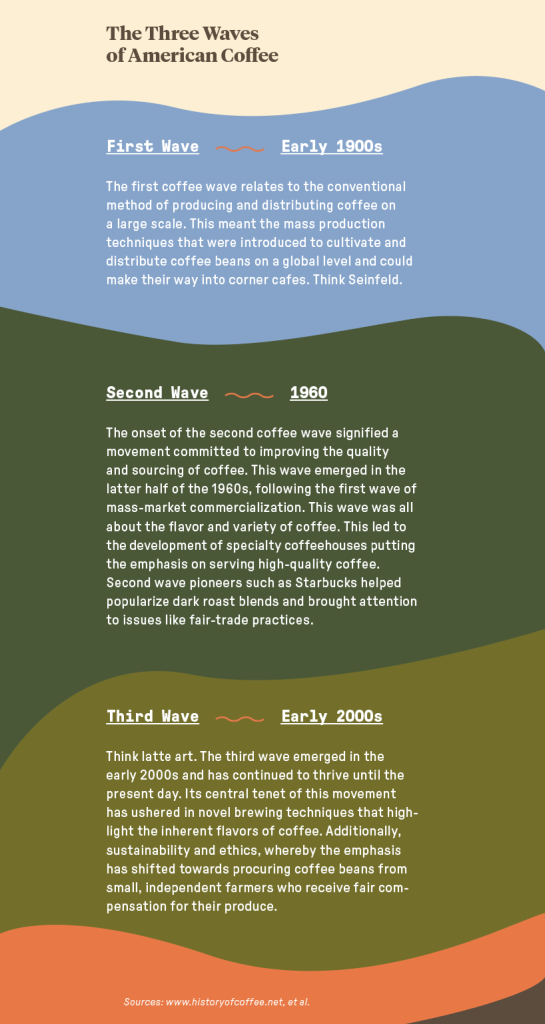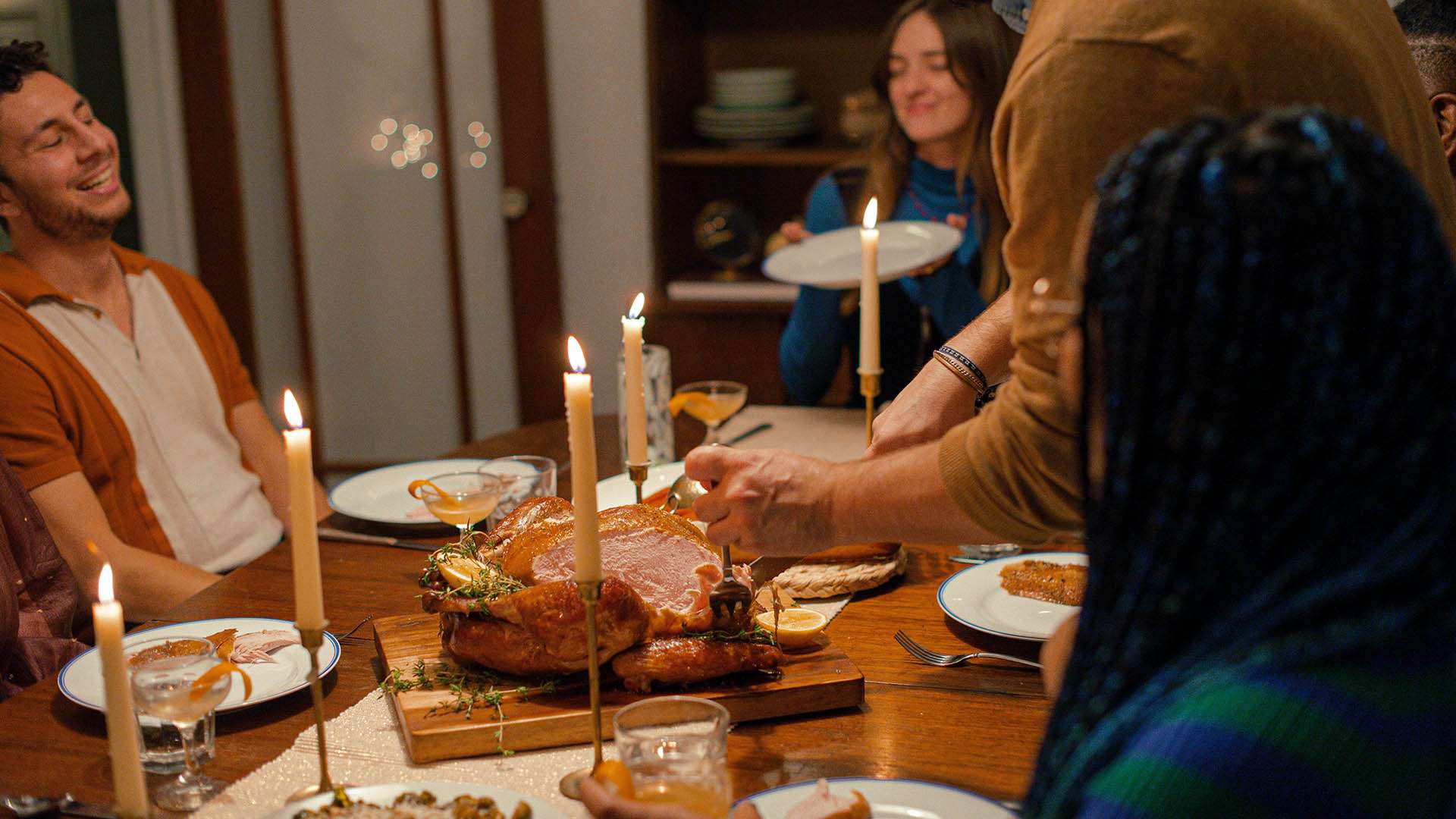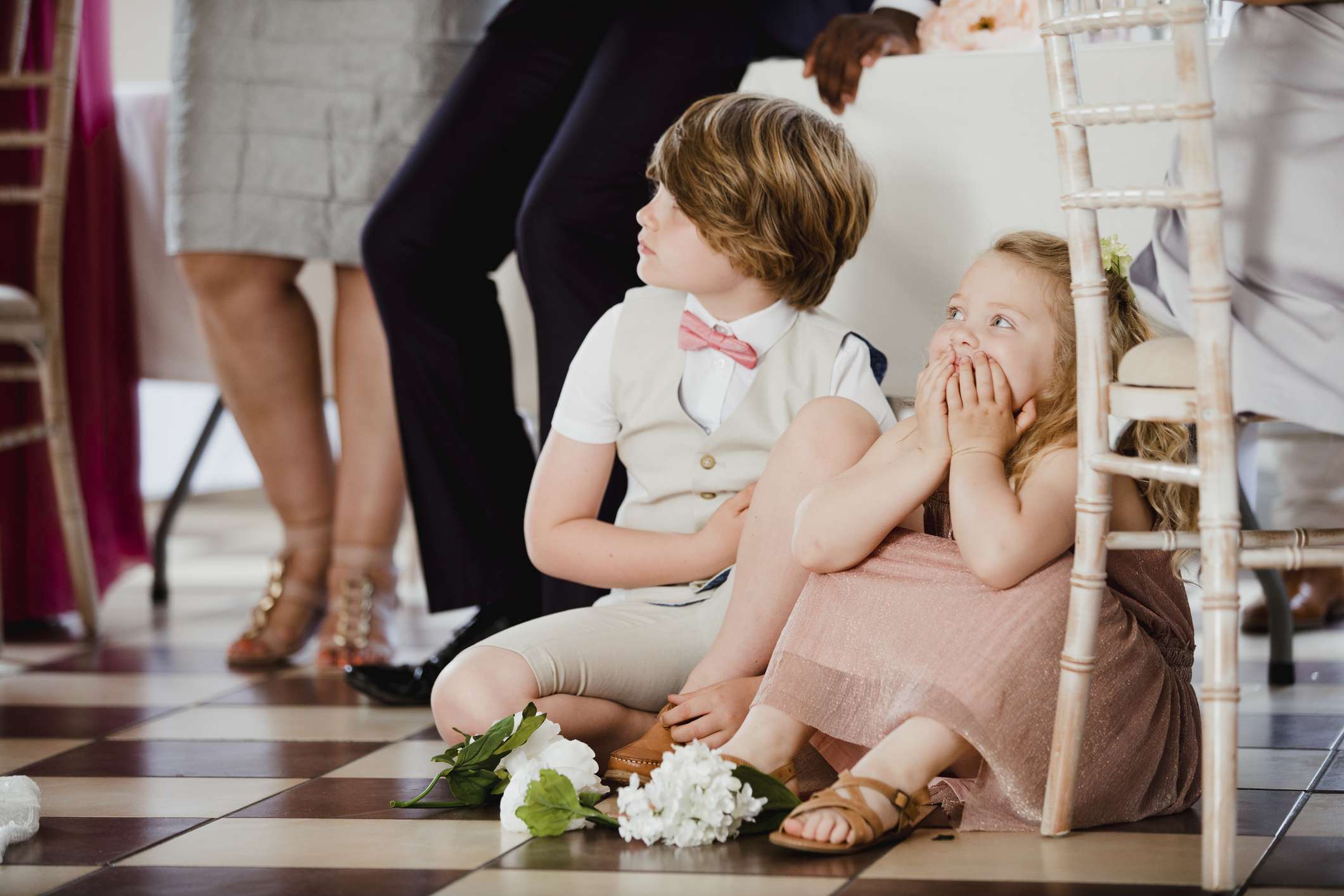
I am writing this, fittingly, from my neighborhood coffee shop. It’s a Friday morning at 10 a.m., and the large cafe is nearly full on a sunny, cold day. As I opened my laptop, this is what I heard at the table next to me, where two women in their early 30s sit:
Woman One: “So, you can pray for that.”
Woman Two: “Is he going to church?”
Woman One: “I don’t think so.”
Are they talking about a brother? A man of interest? I have no idea. What I do know is that history is repeating itself.
Last time I was in this coffee shop, a group of college students gathered at a nearby table. They reached into their backpacks, pulled out Bibles, and began to pray.
It’s not just this cafe, which, I should note, is not branded as a Christian one. It’s a trendy spot with industrial vibes and quirky art — in one painting, a human hand reaches from the sky to plop a man into a cacti-filled landscape. He is going to be placed next to an elephant. A 1980s TV is hanging from the sky. There is also a dinosaur chugging what appears to be an orange soda.
A few miles down the road, there’s a coffee shop that is branded as a Christian cafe — at least in the subliminal way that most of us who have spent time around Christian coffee culture begin to discern. There’s a well-curated selection of products and gift items — candles and note cards and the kinds of things you buy primarily for the aesthetic. That cafe is also a co-working space. It’s next door to a distillery.
While the two spaces vary in their atmospheres and stated proximity to Christianity, the conversations I overhear in both are the same. There are people on dates, people having work meetings with mugs clutched in their hands, people on Zoom or people with their noses in books. And there are people with leather-bound copies of Scripture open to the Psalms or Luke or 1 Timothy, or there are heads bowed in prayer, or there are stray phrases floating through the air that my 37 years spent in evangelicalism have given me a sonic frequency for overhearing: “community group,” for example, or “quiet time.”
While the intersection of Christianity and coffee may be more prominently on display in a Bible Belt city, Christians seem to show up in coffee shops in every U.S. city, and even around the world. One might expect this in, say, Atlanta or Louisville. But Portland? Los Angeles? Manhattan? The Christians per cafe may not be as high a ratio, but they’re there, talking about their Bible studies or their Sunday morning services or their prayer requests.
Even in Ras al-Khaimah, the sixth-most populous city in the United Arab Emirates, a friend told me, a Christian pastor took him to a coffee shop, explaining that he spends considerable amounts of time there meeting with people who are interested in learning more about Christianity.
I live in Dallas County, a mile outside of the Dallas city limits. It’s not suburbia, exactly, though the fact that my children can roam the neighborhood makes it seem like it is in the best ways. It’s very much still the city, though, especially as the Dallas-Fort Worth Metroplex continues to grow. Dallas and the surrounding cities are constantly stretching their proverbial hands out to each other, linking more and more, creating ever-sprawling metropolis that rings of that line from Sleepless in Seattle, when the mother of Meg Ryan’s character tells her daughter that, when she and her husband held hands, their fingers so intertwined that she couldn’t tell which were his and which were hers.
City or suburb aside, you might assume that the reason I overhear all of these Jesus-infused conversations is that I live in what many have referred to as “the buckle of the Bible Belt.” Dallas is a hub of megachurches the size — or scandals — of which make the news regularly. This isn’t an article about the state of evangelicalism in Dallas, but to write about coffee shops here is not exactly dissimilar. Many of the larger congregations here have coffee shops inside them that are open to the public. Some have names like Cuppa, while some have telling names like, “[Church Name] [Coffee Shop].” Some are in churches large enough to also have indoor fountains and playgrounds. Others are small coffee bars wedged in a corner of the foyer.
This is not to say that Christians hanging out in coffee shops is an entirely universal experience, of course. Shonali Paul, founder of Paul John Indian Caffeine Company, says that while you might overhear a Christian conversation or two in a cafe in the southern part of India, it’s hard to find. “You’ll have Bible studies in homes and within a congregation,” she explains, “but Bibles are not brought out in the public as often.”
I have, unsurprisingly, heard similarly from Christians who live in countries that are culturally hostile — or outright persecutory — toward believers. Christians may meet one another for coffee, but they’re not going to pull out a devotional book or use Christian language over a cortado. Those interactions are more likely to take place in private homes.
Though, it’s worth noting, those gatherings nearly always include coffee or tea.
Christians in coffee
While open Christian dialogue may not take place in every coffee shop, Paul, who now resides in Florida, observes that such environments do seem to be “one of the few places left that people from all walks of life pass through everyday. Coffee shops have always been a warm place for people to sit down and relax and enjoy a beverage and a conversation. In India more so, it’s a melting pot of culture and religions that can be really comforting in ways, if you’re used to that.”
Sisters Heather Perry and Holly Perry (who share a last name, but no relation, with me) have noticed this melting pot effect in coffee shops since childhood. Their parents, Mike and Cindy Perry, founded Klatch Coffee in 1993. The company has been “family owned, operated, and argued about” since then.
A nod to the occasionally heated dynamics of a family business seems especially fitting for a coffee shop, where conversation, something that might just lead to argumentation, is an essential component of the ethos. Klatch Coffee’s name comes from the German words “kaffeeklatsch,” which translates to “an informal gathering at which coffee is served” or, more succinctly and perhaps relatably, “coffee chatter.” The Klatches also draw upon the Dutch word “gezellig,” meaning cozy or inviting spaces, as well as the feeling of warmth when humans connect with one another.
“That’s what we have tried to create with our brick and mortar cafe locations,” the Perrys explain. “At least for us, we offer a variety of different drinks — coffee (of course), teas, spritzes, etc. — to ensure there’s something available for everyone.”
At Klatch, all staff members are trained to “welcome everyone with a smile and helping hand” in order to “create that special and comfortable environment you’ll want to keep returning to.”
This leads me to wonder if, perhaps, part of the Christian attraction to coffee shops is that they offer a glimpse of what we often long for church to be. Whether our Sunday morning experiences feel like home or not, it seems that there is a foundational instinct within believers to find that sense of beloved community and inclusion, to be sure that we are part of something, seen and heard, welcomed.
This longing to belong is not simply a Christian desire, though our faith provides reason for it and the ultimate fulfillment of it. It is likely as cliche and saccharine as it is true to observe here that the very God we worship is communal in essence, the Father, Son, and Holy Spirit functioning in perfect unity and connection and the harmony we long for in a congregation or with cappuccinos in hand. We want to be seen, to be heard, to hunger and be filled, to thirst and be given a drink.
The desire to be part of a community has been studied for centuries, by anthropologists and psychiatrists, by sociologists and psychologists, by theologians, by educators trying to build strong bonds among students and those desperate to break up groups that disturb the peace. Church historians have charted the way that togetherness exists at the core of the Christian experience, so very often around food and drink — from the sacrament of the bread and wine to meals shared from the first century until now.
And then there are all the ways that Christians and coffee have merged in terms of aesthetics. It’s possible that — just after a woman walking whimsically through a field — the greatest number of stock images used for marketing products or events to Christian women include an open Bible, an artistic journal, and a latte. Churches brand their crack-of-dawn men’s groups with cups of coffee (black, of course) and retreats with kettles over a campfire.
Third wave, third place
This is when we get to the two thirds of coffee: not two-thirds, as in a fractional cup of coffee, but the capital-T Two capital-T Thirds of coffee: The Third Wave, and The Third Place.
Third wave coffee is what many now refer to as specialty coffee — the types of beverages that people describe using words like “flavor notes” and “a robust profile.” If someone sounds like they’re talking about a glass of wine when they’re talking about coffee, or if you hear the word “artisanal” applied to a cappuccino, that’s a product of the third wave in coffee. Think of terms like “farm-to-cup” or that moment several years ago when it seemed like all of the sudden everyone you knew, perhaps yourself included, couldn’t stop talking about pour-overs. You get it. That’s the third wave.
Third, of course, implies a second and first. It’s relatively safe to encapsulate the second wave in one word: Starbucks. While other major brands like Peet’s Coffee were part of it, Howard Schultz’s vision defined the spirit of the second wave: Coffee was now an experience, not simply a commodity. Inspired by visits to Italy where he observed not only a love for coffee, but for gathering in cafes around coffee, Schultz launched Starbucks not simply as a coffee-roasting business that would get caffeine into the hands of bleary-eyed commuters, but as a place to stop and stay awhile — to have a third place to go, a place outside of work and home, somewhere they wanted to be, somewhere they lingered, the local bar without it being the local bar.
As we all know, it worked.
Society’s living room
Starbucks became a hub of meetings that range from the personal to the professional — and this was well before remote work was thought of as a mainstream opportunity. Suddenly, business people didn’t merely have lunch, dinner, or the golf course as their out-of-the-office meeting places. Starbucks offered a spot where it didn’t need to be a mealtime, or you didn’t need to have four hours (or the skills) to spend on 18 holes. Instead, you could sit in a space that sat at the intersection of cozy and commerce, a place where each person gathered could sip on their individually selected pleasure while collaborating on the project of the day.
Starbucks, of course, also introduced all kinds of drinks that were coffee only in the most literal sense (in that they contained coffee beans) or were simply fun, fancy, frothy beverages with no coffee or caffeine included. There were the white chocolate peppermint mochas I couldn’t get enough of as an underslept college freshman, for example. Or there’s the fact that Starbucks figured out how to offer non-coffee drinkers the coffee experience with choices like the vanilla bean crème frappuccino, with its grave accent mark above the “e” offering that little rush of “I must be drinking something special,” the same way that reading The New Yorker makes you feel like you’re breathing a bit of rarified air, even if you’re reading it in your pajamas on the couch.
While Starbucks has no Christian affiliation — and in fact has been the target of evangelical scrutiny, such as in 2015 when their holiday-themed cups didn’t include Christmas imagery — their more than 40,000 global locations have been a regular meeting place for believers. I myself have sat on Starbucks patios to discuss women’s ministry or outreach events. I’ve stopped by to get my sons a cake pop and overheard Bible studies or prayer groups. The same is true for other mainstream coffee shops I’ve visited throughout my life, where baristas with “coexist” bumper stickers or Pride flags on their cars serve espresso to pastors meeting for breakfast or accountability groups gathering to encourage one another.
Here is the part I don’t want to get wrong: I see common grace all throughout coffee shops, and I could wax poetic about that fact quite easily. Who among us doesn’t have a fond memory in a cafe? I think back on all the time I spent in them in my college days — including my first date with my husband — and I wonder if I knew how precious it was that I could be part of a place where so much life was happening, and on such a regular basis, and for such long periods of time. I probably wasn’t thinking about that. I was thinking about the math test I’d convinced myself I could study for in a bustling coffee shop where another friend walked in every six minutes. I was thinking about an upcoming student organization event or the fact that I was 19 and had met the man I was going to marry.
But I would like to believe that I was also thinking about, or at least experiencing, what a gift it is — in a world that even then was becoming increasingly divided — to let the shared love of coffee and connection be a near-daily part of my life. I would like to believe that I gave an at least subconscious little nod to each person in the cafe, implicitly saying, “I don’t know you, and I don’t know if we believe the same things. But I know we both like it here. I know I like that fact. I know that us constantly returning here says something about who we are as human beings.”
On the other hand, I could also roll my eyes at coffee culture’s elitism — about the ways the snobbery toward the first wave that gave us Folgers and Maxwell House ignores the need working people had to get some warmth and caffeine in their systems and the normal routines of most coffee-drinkers in this country. I could rant about the ways I’ve seen Christians behave in coffee shops — evangelizing to the point of treating people as projects, speaking judgmentally about lifestyles inhabited by the baristas who just served them. I could wonder aloud if we are missing the forest for the trees when our time spent in Scripture needs to feel aesthetically beautiful and accompanied by an eight-dollar latte in order to feel spiritually satisfying.
I could talk about people coming to know Jesus in coffee shops. I could talk about cafes as a home for the heart as much as they are a place for the body.
Instead, I’m going to tell you about Kitti Murray.
Refuge Coffee Co.
Murray founded Refuge Coffee Co. in Clarkston, Georgia, in 2014. Refuge’s mission, “To use a delicious cup of coffee as a platform for job training and personal development of resettled refugees and other immigrants,” seemed to guide every word Murray spoke during our interview, which is not to say that she was calculated. It is to say that she is deeply bought in to what she is doing — in large part because she has seen how God has used it for good.
Refugee Coffee is not a faith-based organization, though Murray is quick to acknowledge that many of its leaders, herself included, are “strongly faith-based people.” For Murray, though, her faith doesn’t prompt her to consider becoming a Christian coffee shop. It prompts her to create a culture where people can be fully themselves. Refuge hosts an annual Community Iftar Dinner, welcoming neighbors who practice Ramadan to eat a shared meal after sunset. This isn’t something every Christian in the community is comfortable with, and Murray understands why. But the higher value, for her, is orienting Refuge Coffee’s role in the community toward one of meeting the needs of its neighbors, something that often appears unexpected or even confusing. There are people who discuss the Bible together at Refuge. There are also people who converse over the Quran.
For the refugee and immigrant community in and around Refuge, the political climate has caused great concern. Murray sees her role neither as one of dismissing fears nor fueling them but in meeting people where they are. Sometimes, that’s through a cup of coffee. Sometimes, it’s via job training and employment. Sometimes, it’s by handing someone a “Know Your Rights” document translated into their language, so that a resettled, legal citizen is further empowered to live in freedom.
A cup of cold water in Jesus’ name. This, I think, is where I leave you: Whether we eat avocado toast or drink lattes or pore over a macchiato-fueled Bible study, we do it with what we share with the rest of humanity in mind, giving thanks for shared spaces to the glory of God.




